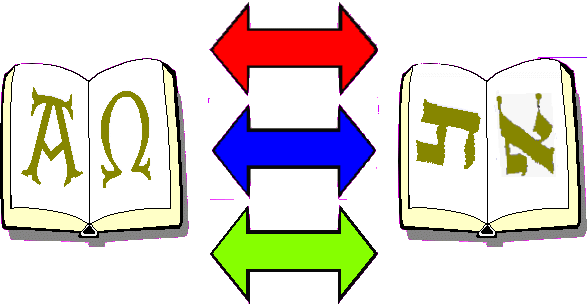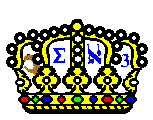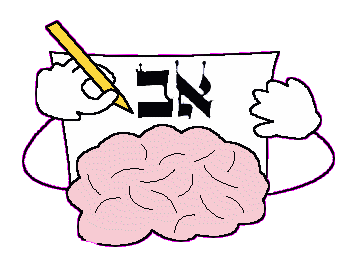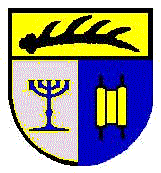|

|
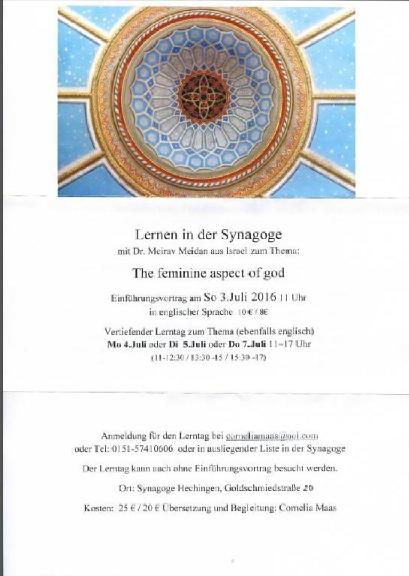
Quote:
|
Vielleicht
immerhin ‚blaue Vorgedanken‘ und\aber Anmerkungen O.G.J.‘s zum / Dank des (und fürs feine) Programm-Flyer/s der  ‚Alten Synagoge
Hechingen‘ mit Dr. Meirav Meidan
(Israel) im/zum Jubiläumsjahr,
bereits im Juli 2016. – ‚Freiheit bestehe‘, so
immerhin/bekanntlich Immanuel Kant, ‚darin: einen Anfang zu machen.‘ ‚Alten Synagoge
Hechingen‘ mit Dr. Meirav Meidan
(Israel) im/zum Jubiläumsjahr,
bereits im Juli 2016. – ‚Freiheit bestehe‘, so
immerhin/bekanntlich Immanuel Kant, ‚darin: einen Anfang zu machen.‘
|
 With a small part of O.G.J.‘s
work/thoughts,
as an example in English: With a small part of O.G.J.‘s
work/thoughts,
as an example in English:
|
|
« SCHECHINA –
the[sic!
|
– שכינה how,
and
what, ever phonetics or Masorah etc., may
have/want it to sound
and be transcripted; at least (meanwhile gendered,) a(n aspect of God)’]
|
[S[c]hekhina[h] שְׁכיִנָה šəxīnāh السكينة sakina …]
|
|
feminine aspect[sic!
 
|
‘perception (only) בּ of/in/by/at aspects’ isn’t always (everyone an) evident (epistemological
‘turn’ – the determinisms of
mechanic/causality views found, hardly noticed, more complex/precis
alternatives). Abut fifteen modal(ities) of/or aspects may
‘be and/or become’ הוויה /hawaya/ intersubjective. – But anyhow,
don’t agreements to disagree (‘narratively’
– in /[h/]aggada/, up to
doctrines / theories) make us better (after all
‘Jews’; comp. J.J. Petuchowski, too)? ‘(Semitic) ideas of unity’
are allowing to be more ‘andווbut vav-hook’-orientated,
than Greek(-Latin
Thought: the partner’s, as the often so called ‘part’s’) ‘hyphenated-disappearance(s
into the same / single / [l]only: something / someone else)’; comp. even
Lawrence Kushner, himself. לֺא / ‘No
need to’ fear the diversities multitudes – (principl[iti]es – ‘order worship’) instead]
|
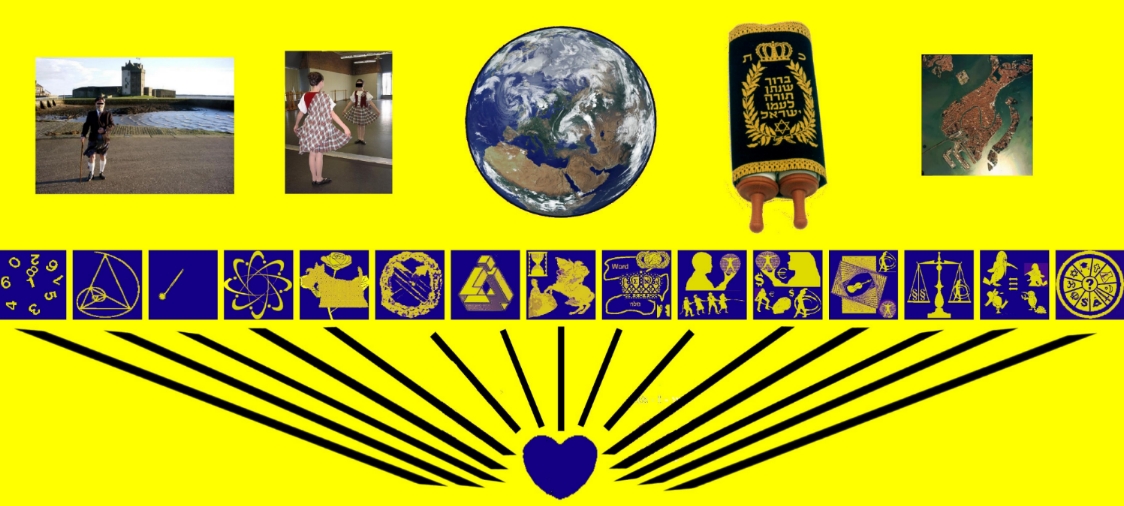
|
|
of god[sic!
|
perhaps, spellings as
‘God’, up to ‘G-d/G’d’, may express/mean respect/reverence (ups) distances/רוח (as /rewax/ and /ruax/ not unexpanded) of/in/to השׁם /hashem/, the name(s) of Adonái – ‘pluralisms’
not necessarily excluded (as
sums-allocating-paradigms do/want it)? ‘Let us’-quotes
of /by /elohim/, /elohenu/,
verbs in the grammar’s ‘singular’ with ‘plural’ nouns, and the other way
round, pp. are going to be discussed,
too/again andװbut ...]
|

|
|
The Schechina appears at the sages[sic!
|
even ‘weise/r Gelehrte/r’; comp. /xoxma/ חוכמה, ‘wisdom/intelligence’, not just qualified or made
by more, other or better knowledge/experiences, sooner/rather by (three/triple kinds of) its/there borderlines / limits / edges]
|
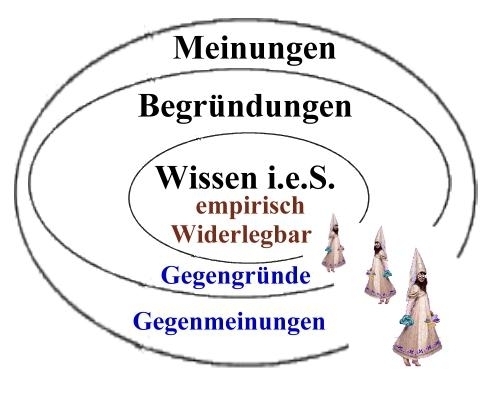
|
|
texts as the presence[sic!
|
comp. the complimentary absence problems of
digital (singular either-or/’tertium
non datur’) logic versus Pantheism,
then/there – within/at the border edges of grasped understanding]
|

|
|
of god[sic!
|
some do/want to ‘understand’ / influence ‘wo/men((hood)’
ups
you/me as ‘God’s present track/s’ here/there on earth]
|

|
|
in
the world[sic?
|
perhaps rather (not
only/always ‘eternal’
– in Greek definition of) ‘reality’. – Social scientists/artists noticed, ‘that things and
happenings, people think are real, are real, in their consequences’ (comp. Thomas theorem). There is/may
by ‘the/this/single/one earth/terra, /(we)’et ha’eretz/ and\but ‘the heavens/skies’. /hashamayim/ (not
necessarily dualism/dichotomy, rather as) עולם /’olam/; or (comp. Markus Gabriel etal./East Asia[‘s Sinologies / thoughts e.g.],
too) even
more precisely/complex named עולמים ועולמות /’olamim (we)’olamot/?].
|
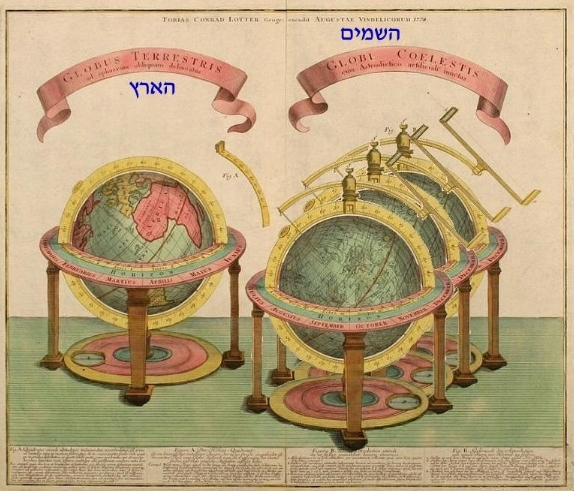
|
|
Her name comes from the biblical
quote: "And let them make me a sanctuary (in Hebrew Michchan)[sic!
|
common verse 8: מׅקְךׇּשׁ /mikddash/ and/but
verse 9: הַמּׅשְׁכׇּן /(ha)mishkhan/],
|
ח. וְעָשׂוּ לִי מִקְדָּשׁ וְשָׁכַנְתִּי בְּתוֹכָם:
8. veasu
li mikdash veshachanti
betocham.
|
|
that I may
dwell [
|
the Hebrew root
shinש-chafכ-nunן in/from וְשׇׁכַנְתּׅי /weshakhaneti/ represents
‘settling’ and
‘persuade’ (the but ‘plural’ word /shikdmu’a/ שכנוע for/from: ‘convictions’,
‘convincing/s’, ‘persuasions’,
‘inducements’, ‘suasiveness/es’), too]
|
ט. כְּכֹל אֲשֶׁר אֲנִי מַרְאֶה אוֹתְךָ אֵת תַּבְנִית הַמִּשְׁכָּן וְאֵת תַּבְנִית כָּל-כֵּלָיו וְכֵן תַּעֲשׂוּ:
9. kechol asher Ani mareh otcha et tavnit hamishkan veet tavnit kol-kelav vechen taasu.
|
|
among them" (exodus 25 8) [
|
/shemot/ שמות ‘names’
25: 8+9 and ‘parallels’; with the/a tabernacle-topos ‘are greeting’, too?].
|

|
|
 According to that,
when the Israelites are crossing the desert, [sic! According to that,
when the Israelites are crossing the desert, [sic!
|
there/Jisrael’s G’d/the (one/’only’ – instead of ‘lonely’
Adonai יח־ה),
even more than, and different from,
‘universal’, too]
|

|
|
god
commands[sic?

|
עשה ayin-shin-hi ‘make’; comp. (even Jewish
/ inner-Jewish / ’Second Temple
period/s’ / Hellenism-universalism) translation /
understanding problems / results, even as
questions in the stricter sense: of Iwrit
– namely/not only – /tora/
תורה – what / who / which ever this / it / She
‘means’/relates
– (/berity/ בריתי English: ‘pact’ / ‘union’ / ‘treaty’ / ‘covenant’
& ‘creature/human being’) into/with/as Greek νόμος /nomos/ English: ‘law’ (διαθήκη /diatheke/ English: ‘treaty’ & ‘last
will/testament’), in connection with (or:
as/for efficient effect/s of?) ‘the rule over, by humans’ (man
but\and men not without woman and\but women; O.G.J. ‘betreffen / beschäftigen die Herrschaftsausübungen des und der, über
den und die Menschen’ – including: policy, politics and polities; the questions of [socio-cultural, economical, aesthetical, juridical, ethical,
pistical
pp.] synchronization / coordination andװbut
how [‘civilised’ versus ‘culturalistic’; Bazon
Brock] aberrance/s, up to violations / contraventions, are handled; comp.
‘renewed updated’ /xadasha/ חדשה Jeremiah
31:31-34, too) at all – Who?]
|
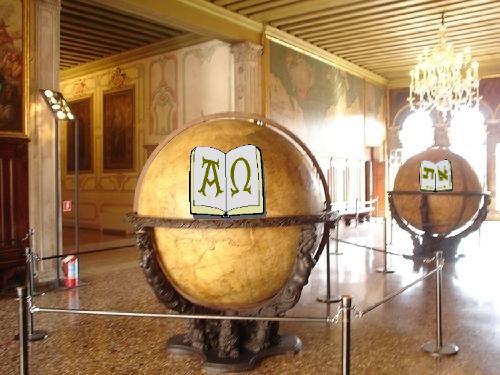
|
|
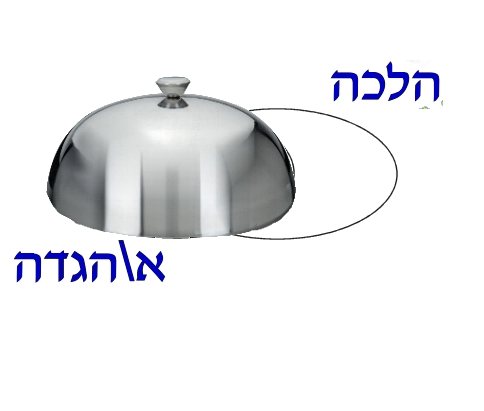
|
|
them to build a sanctuary
|
[/mikdash/ and/but /mishkhan/]
|
|
|
so his presence[sic?
|
‘glory’, ‘brilliance’ pp. , too – or amazing overbear?]
|
|
|
can[sic?
|
but hardly meaning,
‘that God\G’d wasn’t/couldn’t be/come there /
everywhere before/otherwise/since’?
Comp. almightiness-paradoxa of  /shadaiy/, too] /shadaiy/, too]
|
|
|
be among them.
|
[There are / may be Gnostic influences in / on / from Cabbala,
as well/bad as everywhere – but
it (and Hasidism) is somethought
ups something different/else, too: O.G.J.]
|
|
|
In the kabbalist's texts god's
presence, the Schechina,
appears[sic!
|
since when, in which grades/extends and
why? – Talmudic ‘nesting birds’- and ‘neighbour/hood’-allegories
are hardly gender specific, rather anthropomorphically and human
experience. Is the Bahir different from Zohar by / in / with(out) erotically aspects (even
sexual conditions, up to differences, with somehow ‘platonic’ / ascetic / ‘celibacy’
affections)? ‘Discrimination’ – inequalities
as such, often correlate/s with
modifications of somehow utopian
expectations (decisions
how to organize relationships), expressed in allegories / stories / language / behaviour etc.
changes]
|
|
|
in the Personification[sic!
|
how fare is/was/goes
‘person/s’ a/the Latin concept to cope with trinity-problem/s plural-question
in אחד /exad/
to אחת /axat/?]
|
|
|
of a feminine image[sic!
|
since/from Genesis/bereshit
1:26 דמות
/demut/ (comp. verbal: ‘to image’, ‘draw a
likeness’; ‘describe’; ‘reflect’; ‘picture in the mind’) and\but צלם /tzelem/
(‘photographer’,
‘cameraperson’; ‘figure’, ‘image’, ‘icon’,
‘idol’) for/in: the G’d and\but
/’adam/ אדם (as well as /’enosh/
אנוש
– neither [only/always] a singularity’s singular/individual, or just prototype,
nor a pure male [mankind/menkind] or
female [womenhood/womankind pp. – as ‘the
Myth(os)’ has it, in
its/there basic structure/s [comp. Mircea Eliade]; e.g. Greek Prometheus didn’t send well known
Pandora; neither male/men always robbed and raped/enslaved the
matriarchs/Amazons pp.]) relations, at least – transferences expected /
problems, up to behaviourally
answered questions, received].
|
|
|
In our course we will meet
the image[sic?
|
up to ‘(H)erself/ves’? – ‘vita activa’ and ‘vita contemplativa’
needn’t rule each other digital/dichotomy strict out; comp. Hanna(h)
Arendt]
|
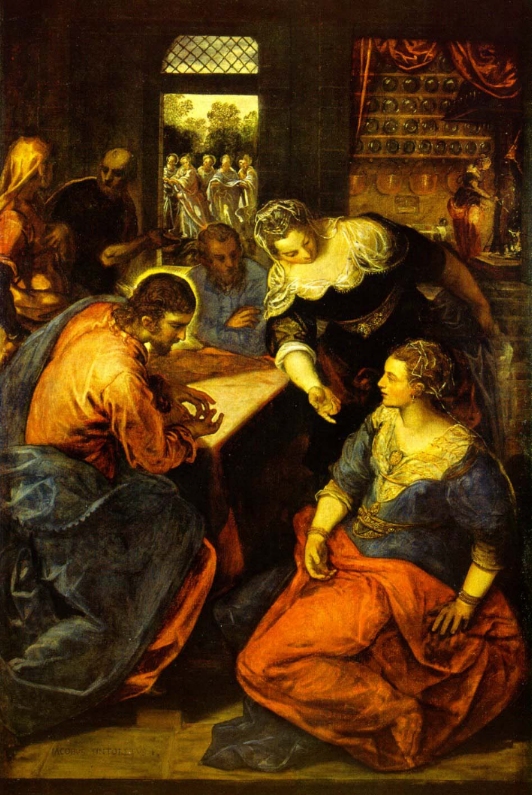
|
|
of the Schechina.
We will ask:
|

|
|
of the Schechina.
We will ask:
|
[Jews, Christians and Muslims use alike
expressions partly meaning / naming the same?]
|
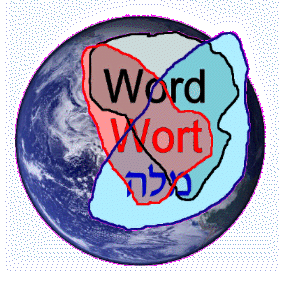
|
|
What is her Characteristic[sic!
|
‘a word’ with rather different meaning-horizons in
German and English or Hebrew, too]?
|
|
What kind of symbolisms[sic!
|
analogies and symbols are part of the
‘representing / representative side’, influencing, and influenced by, the
represented (comp. Alfred Korzybski), but often suspicious of
idol / worship: Conflicts of beauty, grace, harmony, pregnancy, gentleness,
purity/cleanness, clearness, hair, dress, voice, move,
active/passive-manners, temptation, charm, pleasure, profession/s etc. pp.
may appear, very soon]
|
|
|
describe her
|
[e.g. the ‘Queen
Shabbat’, comp. the first word’s Otiyot בראשית of/in Tanach, at
all, sorted as: שבת ירא /yare’ …/ (‘fearful’, ‘dreadful’;
‘respecting’, ‘venerating’); perhaps G-d’s daughter/s (comp. Semitic grammar’s mixed
gender groups – just very often called / translated / remembered /
handled ‘[as] male’ – versus pure female ones, only), even ups
divine sister/s, bride/wife …, װbut of cause comp.
the mythos’s structural goddesses-legend/s (e.g. heros/heroines, demigods; comp. /nefilim/
since 1.Mo. 6:4) versus/up to/with Her Ladyship’s even ‘Women of Learning’? (by
Mei.Mei.); comp. /[‘craving/desirous/longing for’] ta’ew shir [‘poem/song/ballad’]/ תאב
שיר]?
|
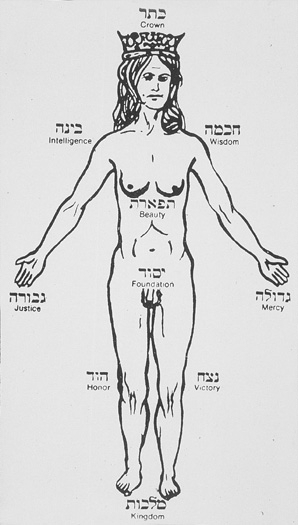
|
|
And how does her image[sic?
|
our/others (lingual,
optical, haptic/tactile, neuronal, emotional pp.) representations of … (the
represented / meant / mapped)?]
|
|
|
create and influence the relationship between men[sic!
|
individuals, collectives,
genders, generations, cultures, civilisations … ‘people’ is(n’t only representing a/the singular (of an ethnic,
gender mixed, group) uncertain/unsure/indefiniteness, in English;
comp. analytical / semiotic ‘turn’ (by
philosophy: What does the expression/word/act mean/effectuate
(t)here/when/whom? Neither ontology ‘what the represented[‘s
character] is’, nor epistemology ‘what we can understand of it’.)]
|
|
|
and
|
[who(m)s?/which?]
|
|
|
god?
|
|
|
|
(And why does the kabbalist[‘s
|
– a female Kabbalit’s
(and her husband’s; comp. La. Kushner’s novel ‘Kabbala: A Love Storry’, too) perspectives (even
‘meqabbelot’ up to ‘mequbbalot’?) might add more/other complexities, too]
|
|
|
wife envy her ...?).
|
[Not all jealousy-questions are
capacity/quality-problems, or ‘totality versus totalitarianism/tyranny’-issues;
comp.
Ernst A. Simon, too. – And\But isn’t G’d …?]
|
|
|
Also we [sic!
|
different orders of grammar-person’s
priority, positions of the most important expressions in the sentences,
orthography and calligraphy – semiotics
are tricky courtesy expectations]
|

|
|
will wonder: why
is it that the presence of god in the
world[sic?
|
‘on earth’ / ‘under the
sun/firmament’, ‘between/with humans’ pp.]
|

|
|
appears specifically as a feminine character?
|
|
|
And what is her relation
to the male aspect [sic!
|
perhaps more than singular-one,
and/or the (proto-/arche-)typical ones,
too?]
|
|
of god.

|
[/? – ‘Doing gender’/dyadic relationships (‘one and\but
one’ perhaps mathematical / called: 11/eleven ups is/n’t י״א it װ?) turns out as a very ‘early’/basic
distinction, soon after/behind ‘God versus ‘not-G’d’/’adam/’enosh/-relationships;
with all the ‘image’ and ‘expectation’-topics plus analogies, but
‘un-identity’-questions – on/by ‘the labyrintho
stronghold of comparisons’ – of/from/to/with ‘borderless different G’d’, at the same times/s and place/s, intersubjective
concordant only describable by ups ‘philosophia/theologia negativa’ (the
ontological not-[only]-‘doctrines’: ‘God is/becomes not completely/only anything
– apart of existing’; comp. Mose ben Maimon/Maimonides, too). AndװBut consequent
not-lonely (even participating/interactive) observers –
often so suspicious – dual(s) estimated: Two are going to ‘be/come’
able to ‘light’/’understand’ more than the sum of both partners’s experiences (rooms/ranges) together – ‘being/becoming’
הויה a ‘higher’ / an other
kind of a/the ‘middle/sphere-bubble’, too.
|

|
|

|
It needn’t be/remain an
unknown secret, that dialog/s consist of the tree (dangerous
– even affecting) elements:  questions (having interest/s in
anyone/anything, at all), questions (having interest/s in
anyone/anything, at all),  statements (never
just/’neutral’/‘pure’ countable ‘information’ without bigger
contextual/emotional situated, indicating ‘exformation’;
comp from NØRRETRANDERS
to: the ‘black fire’ of ‘deadly/fixed written’ שבכתּ׳ /shebiktaw/ versus ‘[its other sides/back]
white fire’ of ‘living/oral spoken’ פּה שבעל /shebe’al
pe/ torah תורה between, behind/around and over it) andװװbut statements (never
just/’neutral’/‘pure’ countable ‘information’ without bigger
contextual/emotional situated, indicating ‘exformation’;
comp from NØRRETRANDERS
to: the ‘black fire’ of ‘deadly/fixed written’ שבכתּ׳ /shebiktaw/ versus ‘[its other sides/back]
white fire’ of ‘living/oral spoken’ פּה שבעל /shebe’al
pe/ torah תורה between, behind/around and over it) andװװbut  (rather
unpopular/de- and/or escalating) pauses (to understand/’translate’ – instead
of using the time of others speech to formulate my [apodictic to brilliant]
replay; to think, even to examine/test/experience); anyhow breaks (even
distressingly) needing to restart/risk the interaction again: As it is/was from
the beginning/Genesis ‘and/but God spoke’ ויאמר /wayoommer/, up to
contradicted the given facts, not only this initially ten times (comp.
Rainer M. Rielke: ‘aus Gottes großem Brückenbau’, too). (rather
unpopular/de- and/or escalating) pauses (to understand/’translate’ – instead
of using the time of others speech to formulate my [apodictic to brilliant]
replay; to think, even to examine/test/experience); anyhow breaks (even
distressingly) needing to restart/risk the interaction again: As it is/was from
the beginning/Genesis ‘and/but God spoke’ ויאמר /wayoommer/, up to
contradicted the given facts, not only this initially ten times (comp.
Rainer M. Rielke: ‘aus Gottes großem Brückenbau’, too).
|
|
|
|
At least if from / in case of, the same/equal
‘meet/flesh’ (/basar/ בשׂר) and/plus/but ‘bones/essence’ (/’etzem/ עצם)
as /kenegdo/, ‘facing ones’, may open/contain
different / discontinuities with ‘equal rights/value’, ‘equal
chances/status’ and/or ‘equal birth (not
just/after all affecting aristocrats)’ pp.-questions, and together
with /’ezer/: an/the ‘opposed power’; not
only/just (a week, obediently kind of) ‘help’, as (to) many (dictionaries) still ': ‘His/Her
Majesty’s most loyal opposition the Houses of Parliament’-, /
(ha)Knesset/-relations are greeting; comp. Ruth Lapide.
Even
inequality can be helpful/needed, under conditions; comp. at least a(/the
29. century’s)
‘theory of justice’ by John Rawles and others.
With (spotlights on) a lot of (unfair, waisting/obstructing,
intercultural spread mis)uses of structural powers.]
|

|
|
More
than that we will ask: what all of these texts are doing in a monotheistic[sic!

|
a thought/word based on Greek singular- and
unity-understandings: Does taking the wawוvav out of the (actual
square font) alef, in אחד (spoken ‘male’ /’exad/
or even ‘female / emphasized’
/’axad/), an important word for/of G’d’s (rather ‘borderless’ kind of) unity in (a/the
suspect horror in/for Indoeuropean singular-concept/understanding, namely/mainly
Greek Thought/’Gnosis languages’) plural/s, leave the (two –‘ me
and …’) lonely jud(s) in/from יחיד /jaxid/, the
singular(ity) of/for ‘one’
(now/here separated by the  chet, written as
in the Tora-scrolls – locking and sounding as if two of the same ז zayin fight/face
each other/s needing/s – knowing better, but wishing that (sociology –
dialectic pp.) wouldn’t take place / be the case; comp. Lawrence Kushner, too)? –
‘Mit G’tt warden wir (Menschen) nie
zu rande kommen (not be able to cope with something
/ not get on with somebody), weil Gott gar keinen Rand (has no
‘border-edge’) hat.’ (comp. Albert Keller’s theologia/Philosophia negativa) – Are
we / Is ‘menkind’
answering/handling questions of border management regimes (comp.
Ralf G. Dahrendorf)?] chet, written as
in the Tora-scrolls – locking and sounding as if two of the same ז zayin fight/face
each other/s needing/s – knowing better, but wishing that (sociology –
dialectic pp.) wouldn’t take place / be the case; comp. Lawrence Kushner, too)? –
‘Mit G’tt warden wir (Menschen) nie
zu rande kommen (not be able to cope with something
/ not get on with somebody), weil Gott gar keinen Rand (has no
‘border-edge’) hat.’ (comp. Albert Keller’s theologia/Philosophia negativa) – Are
we / Is ‘menkind’
answering/handling questions of border management regimes (comp.
Ralf G. Dahrendorf)?]
|

|
|
religion? [sic?

|
How do you/we/they understand/use / experience the ‘conservatively (‘lost/s’) versus (‘to find/develop’)
progressively’-word-/imagination-fields (up to ‘ideology’, ‘cult’ pp.) representing / meaning methods / decisions ‘how to handle realities, including ourselves, others
and expectations’? – Even if there wouldn’t exist another reality than the
grammar(‘s ‘futurum exactum’), ‘we can’t get rid of God(-substitute-expressions),
because we cannot think without ‘grammatica’ (comp.
F. Nietzsche): If/As long as  we define
‘belief/trust’ א־מ־ן as a (once to overbear) sub-category of ‘knowledge’,
we are/remain as
lost/trapped, we define
‘belief/trust’ א־מ־ן as a (once to overbear) sub-category of ‘knowledge’,
we are/remain as
lost/trapped,  as if we muddle it (the
subject-subject-relationships questions) up with / reduce or substitute them
to/by ‘holding statements/facts for (the/a(n
un/)tru(c)e’ (comp.
Martin Buber’s just ‘secondary structure’, up to Richard
Heinzmann and: ‘I/You belief/mistrust you/me;
is/becomes not identical with [exactly all] what you are / I am saying / meaning / doing pp.‘); as if we muddle it (the
subject-subject-relationships questions) up with / reduce or substitute them
to/by ‘holding statements/facts for (the/a(n
un/)tru(c)e’ (comp.
Martin Buber’s just ‘secondary structure’, up to Richard
Heinzmann and: ‘I/You belief/mistrust you/me;
is/becomes not identical with [exactly all] what you are / I am saying / meaning / doing pp.‘);  but/and as wrong as regarding (established, up to
empirical proves, or there absences) convictions higher than anything / anyone else.] but/and as wrong as regarding (established, up to
empirical proves, or there absences) convictions higher than anything / anyone else.]
|
It isn’t/need not to be/come a/the equal identical
unity with God, overcoming the creation/s at all, that has to be found /
got / constructed back (comp. Latin: ‘re-ligio’;
or: to become developed, by progress) – but the quesrions
are rather for/of/from dialogig relationshops beween equals
and with/to/from the differenz ONE אחד
instead of יחיד.
|
|

|
Are aspects / points of view /
dimensions available, to distinguish ‘Gnostic Thought’ (in
the sense of totlitarians by Indoeuropean
singular(ity)-discovery-developments as
(null-)sum-allocation (game/theory) paradigm / reductionism on determined
heteronomy – particularly in ( as parts of Biblical, Kabbalistical and at/after all Mystical
texts / teachings / Thought[s – receptions])?
|

|
|
Karl Hartman’s intensive (courageous,
hardly known/discussed) work lists/sums up suspicious topics (at least, liable to be influenced) as:
|
|
|
|
 Dualism: world – heaven / body – spirit / light –
darkness / good – evil / right - wrong Dualism: world – heaven / body – spirit / light –
darkness / good – evil / right - wrong
 Emanations: material sign of increasing distance
from/to God (point/dot without any
extension ideal) Emanations: material sign of increasing distance
from/to God (point/dot without any
extension ideal)
 The creator as demon against a very fare away /
distant God of Love The creator as demon against a very fare away /
distant God of Love
 A/The divinely soul (‘spank of eternal light’)
trapped in a/the body A/The divinely soul (‘spank of eternal light’)
trapped in a/the body
 Contempt/Disdain of the body: ascetic (and/)or libertinism Contempt/Disdain of the body: ascetic (and/)or libertinism
 The redeemer a spiritual being, incapably to
suffer(ing) The redeemer a spiritual being, incapably to
suffer(ing)
 Gnosis: Recognition of supreme knowledge about the
interrelations, elevation above the uninitiated believers[sic!]
and materialism Gnosis: Recognition of supreme knowledge about the
interrelations, elevation above the uninitiated believers[sic!]
and materialism
 Returning home of the sole, by overcoming hostile
aeons, with secret knowledge (the yet inevitable desire to be/com closer to/with G’d than anyone/anything else; comp. resh by La.Ku. –
cancellation/revocation of the realties as ‘salvation,’ instead of
‘reconciliation and interactive modification’) Returning home of the sole, by overcoming hostile
aeons, with secret knowledge (the yet inevitable desire to be/com closer to/with G’d than anyone/anything else; comp. resh by La.Ku. –
cancellation/revocation of the realties as ‘salvation,’ instead of
‘reconciliation and interactive modification’)
 Apocalyptical speculations. Apocalyptical speculations.
|
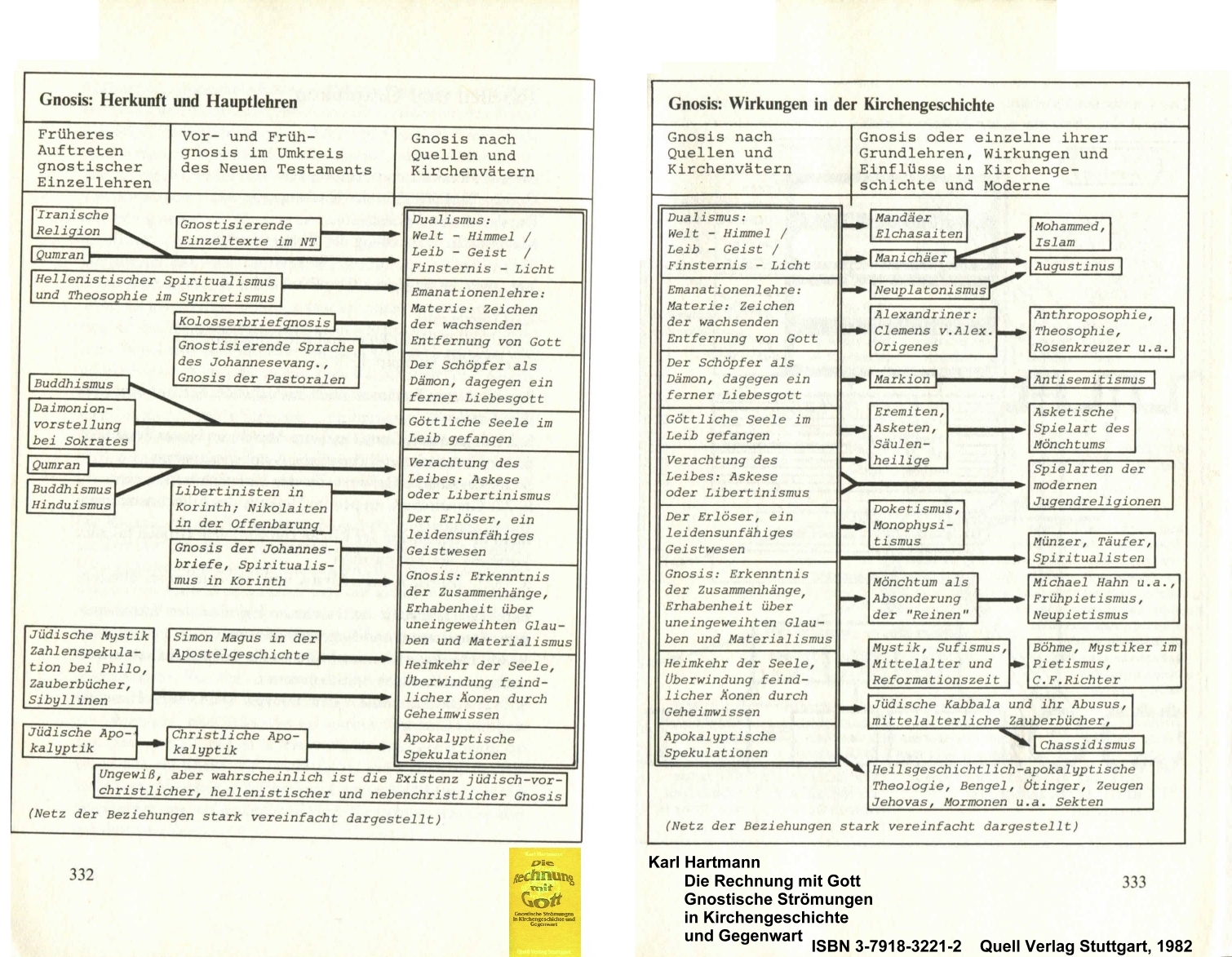
|
|

|
Not just Albert Keller showed, that the ‘spirit versus material, and/or the other way round’-topics (and even that of not-synonym ‘soul’, ‘body’ and/or
‘spirit’ separated form ‘[being a] life’) as such, aren’t helpful/needed to understand: There
are centres of human actions (‘we’ usually call ‘I’ –
/ani/ up to /anochi/?
– not actually overcome by calling them ‘[super]ego’ [ups] ‘you’ or ‘us’
pp. – super toto not the same as / not
identical with accountably guilty blame / missed targeted
destinations) opposing empiricism
(including things and happenings ‘to be/com’, as
e.g. books, bodies, earth, crime, love, ideas/thought, ‘windows of
opportunities’ etc. and
ourselves, too; comp. Carl Friedrich v.
Weizsäcker: ‘Es ist der menschliche Verstand, der jenes Ganze zu dem er
selbst gehört, in Teile zerlegt um es (begreifend; Richard Heinzmann) zu
verstehen.’ – Just/Yet partly
analytics for grasped understanding, may poem/s ...)
|

|
|
|

|
/baruch ‘ata adanai ‘elohenu melek … weha’olamot?/ – Blessed/Welcomed/Respected
are you LOrd G’d,
King of … (but all) the female realities, too?
|
|
|
|
|
|
‘Once upon a time’ visitors from the United
States of America were invited to the Old Synagogue in Goldschiedstraße.
The
son of a too old and
sick Jew, emigrated from Hechingen, gave his father’s speech, here in English.
– Ein Vater, der kein Englisch
versteht, bat damals seinen Sohn, um nachträgliche Übersetzung / the blessing: ‘that dieses Haus wieder ein Bethaus werd, … dieses Haus ein Versammlungshaus … Lehrhaus,
… Schechina
da …’ בית כנסת העכינגען

|
 home page: Synagoge
Hechingen home page: Synagoge
Hechingen
with reverences to/for Co.Ma.
& Me.Me.
|
An old
image: /adam qadmon/
the so called ’first / originally /
undivided as one androgyn drawn human being‘ with
a version of the ten /sefirot/ ‘spheres’ of
Kabbalistic ‘tree of life(death’. A TV-still shows one ‘drawing - of
orbits around a double centre - on her leg’. The third and second last
picture of this example illustrate:
‘a centre of human actions’ (bottom as /lew/ לבב ‘heart’)
‘filtering/percepting’ empiric realities (on top)
by 15 modalities (middle
line as aspects between both opponents
כנגדו). The Key and sword ‘coat of arms’ for ups of /mugbal/, /shamur/, /sod/ … ‘secret/s’ here, is part of a now
university-city’s. This (coat of ‘arms’ / Heraldic ‘identity’ Sala dello
Scudo symbol’s/’individual
ups audience distance’ and maps) room, around - after all (they/we
realized) – both opposing (coelestis
and\but terrestris) globes, is found in the Doge’s apartment at the
‘Palzzo Comunale’
of/in Venice. – Sorry for any copyright violation, posible at all.
Please be
careful/aware, this text/s could contain/mean the Holy Name.
|
?
|
 in honour of Sir Jordan, his company and the crew of MS Wilhelm Tell II by Mrs. Gisela & Mr. Olaf
in honour of Sir Jordan, his company and the crew of MS Wilhelm Tell II by Mrs. Gisela & Mr. Olaf![]() by
by 


























